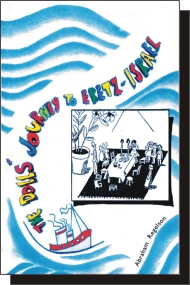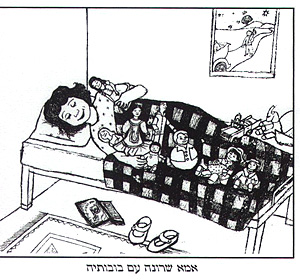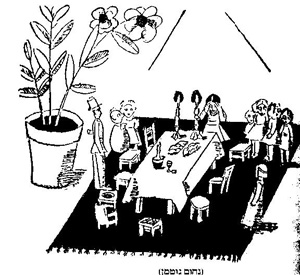By Abraham Regelson

Translated by Sharona (Regelson) Tel-Oren
Verses translated by Naomi (Regelson) Bar-Natan
A fanciful adventure story of a doll family’s journey by land, sea and air, on their way from America to be with their mother Sharona in pre-state Israel (1933).
 Synopsis:
Synopsis:
Some seventy-five years after the first edition of this well-loved early Hebrew children’s classic appeared in Tel Aviv, here is an English translation by the author’s daughter Sharona, who as a little girl was the original “mother of the dolls”. When her family emigrated from Cleveland to pre-state Israel in 1933, the dolls were left behind with Sharona's friend Phyllis, but they –yearning for their mother’s care, her songs, stories and Sabbath table – are determined to follow her across the Atlantic. Steeped in Jewish lore and sentiment, this delightful doll-fantasy is intertwined with the real-life adventures of the author's journey with his family.
Sample excerpts
 Call me Abba. Bespectacled am I, and my shoes – always dusty. I polish them every Tuesday and Friday, but that doesn't help one bit, because, you see, I live on a sandy beach. Should you happen to meet a bare-headed Tel-Avivian, glasses perched on his nose, shoes all dusty, and on his arm a shopping basket spilling over with beets, onions and radishes, you'll know it's me bringing vegetables home, food for the kids.
Call me Abba. Bespectacled am I, and my shoes – always dusty. I polish them every Tuesday and Friday, but that doesn't help one bit, because, you see, I live on a sandy beach. Should you happen to meet a bare-headed Tel-Avivian, glasses perched on his nose, shoes all dusty, and on his arm a shopping basket spilling over with beets, onions and radishes, you'll know it's me bringing vegetables home, food for the kids.
Thus begins an enchanting tale of an adventure-filled voyage across the ocean, from America to pre-state Israel. The year was 1933, and the travellers – a family of dolls. Or is this a real-life family chronicle of the hardships of immigration and absorption, related as a whimsical doll-fantasy? A picture of how people lived in what was then Jewish Palestine, how they spoke, and what they felt toward their ancestral homeland.
Written by Abraham Regelson, the poet, author, essayist and translator – a former recipient of the prestigious Lamed, Brenner, Bialik and Neuman (NYU) Prizes for Hebrew literature, The Dolls' Journey is a vintage book, treasured as a children's classic in the memory of many veteran Israelis. Among them was the late songwriter Naomi Shemer, who, in a radio interview, named it her favorite childhood read. KibbutzYagur, one of Israel's largest and most venerable kibbutzim, when celebrating its sixtieth anniversary, sought a play depicting the flavor of those early years, and chose to present a musical based on this book. After five editions and 50 years as a best-seller, it went out of print. Years later, it had often been mentioned on Yaron Enosh's weekly call-in radio program "Kol Shishi" (Friday Voice). On these broadcasts, Book Hunter Itamar Levy had declared, "One of my most frequently requested books!"
English translation, prologue and epilogue by the author's daughter Sharona, who was the actual "mother of the dolls" ("Imma Sharona"). There are original illustrations by Nahum Gutman, Aryeh Navon, Bina Gevirtz and others, from various previous editions.
What were dolls like in those days? Certainly not like those we have seen in recent years: Not dolls that walk, talk, drink, wet, roll or shut their eyes – certainly not Barbies or Kens! Simply made as they were, they broke easily, but that was all the more reason to cherish and nurture them like wounded children, rather than discard them. The first chapter introduces and describes all the dolls in detail. There were seven girl-dolls, one of them with a broken leg. Though their faces had fixed expressions, each was endowed with a distinctive personality and talents. And there were two "sons" – not really "boy-dolls": one was a wind-up metal toy which jiggled and wiggled when the key in his back was wound (he was called Popeye because his eyes bulge – eyes that "pop" – and was not the familiar comic-strip character); and the other, described thus:
Thingumbob – has "Made in Russia" printed on him. Small he is, and red, egg-shaped from his neck down, and made entirely of wood. Something funny about Thingumbob – you just can't knock him down. Put him down – immediately he's up again. Step on him – up he bobs. He's as naughty as they come. And how he eats! No matter how much he packs away, it's never enough.
After the State of Israel was established, both Popey's and Thingumbob's names were Hebraized in later editions: Popey became Balt-Ayin (meaning "bulging eyes"), and Thingumbob was now called Milta Zotarta ("insignificant little one"). In this edition, they have their original Anglo names.
How little "Imma" Sharona mothered and cared for her "children"!

Imma Sharona with her dolls
When her parents decided to move to Eretz-Israel, Sharona said:
"I'll make a present of my dolls to Phyllis." Phyllis was the neighbor's daughter, who lived in the apartment above ours, and she was Sharona's best friend.
And so Sharona took the dolls upstairs to Phyllis' house, telling her: "We're moving to Eretz-Israel, and I'm giving you my dolls. Be sure to give them food and drink, and to take them for walks. See that they don't bicker and quarrel among themselves, but that they live together in peace and harmony. Mind that Popeye doesn't pinch the others, and that Thingumbob doesn't butt them with his little head. And don't forget to brush their teeth with toothpaste regularly every morning."
Phyllis rejoiced over the dolls, and promised that she'd do everything Sharona requested.
Kissing her dolls, Sharona directed: "Be good dolls, and don't vex Phyllis. When she serves you food, eat properly. Be sure not to spill your milk, and go to bed early. You, Shoshana, are the eldest. You must see that they all behave themselves, and that they are always kept clean. Shulamit will help you."
Then she kissed Popeye and Thingumbob, and bade them to behave themselves and to be good boys.
And I do believe that the dolls didn't realize that Sharona was going on such a long, long journey, so very far away from them, because they let her go, and didn't even mind at all. Nor did Sharona herself clearly understand that she was parting with her dolls for such a long time, and maybe even forever. The move to Eretz-Israel was almost like a game to her. So Sharona didn't cry at all when she said farewell to her dollies.
Phyllis did her best to be a good mom to the dolls:
At mealtime they were fed, at bedtime they were tucked in; she took them for walks, and gave them cakes and candy. But the dolls didn't love her like they did their own Imma Sharona. They missed her terribly, and became cranky and weepy. Even Shoshana, the eldest, was constantly in tears. At night they would wake from their sleep crying: "Sharona, Sharona! We want to sleep in Sharona's bed!"…
…One Sabbath eve Shoshana and Shulamit bathed themselves and their younger sisters, and then announced to Phyllis: "We want to have a Sabbath table, just as we did with Sharona." Phyllis hadn't the slightest idea how to go about setting a Sabbath table, and let the dolls do as they liked.
Shoshana placed a small table in the middle of the room, and put the dolls' chairs around the table, one for each, and for Popeye and Thingumbob as well. Shulamit spread a white tablecloth on the table, and laid out tiny loaves of the braided Sabbath Halla-bread that she had baked herself, and miniature candles in decorative candle-holders, and a little bottle of wine with a tiny glass for Kiddush (the Sabbath blessing) – everything exactly as if Sharona were with them.

Nahum Gutman
And Phyllis watched carefully, because she wanted to learn Sharona's ways. Maybe, if she did everything the way Sharona did, the dolls would begin to love her. Shoshana lit the candles, made the blessing on them, covering her face with her hands, just like Sharona. Then all the dolls sang the song that Sharona would sing with them every Sabbath eve, after the candles were lit. The name of the song was "Keepers of the Sabbath". Shulamit, whose voice was pure, sang …. in a quiet and sustained melody, just like Sharona.
…Then all the dolls, remembering how Sharona would sing with such sweetness and grace, were so overcome with longing for her that they burst into a bitter wailing. Even Popeye cried, and so did Thingumbob, and when Phyllis saw them all in tears, she started to cry too. Then she tried comforting the dolls with engaging stories and enticing promises, but they simply would not be consoled. That night the dolls went to bed without tasting a crumb. They just cried and cried until they fell asleep.
Phyllis realized that the dolls would never love her as they love Sharona, and in her heart she resolved: "I will send them to Sharona, to their Imma in Eretz-Israel, for with me they will just pine away and become ill."
As she was making the arrangements to send them off, the dolls held a meeting among themselves, in which they unanimously decided to plead with Phyllis to send them to their mother Sharona in Eretz-Israel. Phyllis responded to their plea by taking them outside, where the car she had pre-arranged for them was waiting to take them to New York, with driver Viking at the wheel. Many were the adventures ahead. Here's an example from the first lap of their long journey, when the car began misbehaving:
A mechanic was summoned from the nearby town, and he too picked and poked, fretted and sweated, but in vain all his efforts! The car just would not go. Perceiving how hopeless was their situation, Thingumbob offered: "Let me try. I bet I can help."
Now, if you've ever seen the inner works of a car, you'll know that down front there is a small four-bladed fan looking something like a windmill, and that when the engine works, the fan blows full speed on all the cogs and tubes within. Up jumped Thingumbob, perching atop one of the fan's blades; from there skipping to a second, third and fourth blade, until by and by the fan was rotating briskly, and the motor began a-chugging "CHUG-CHUG-CHUG", until at last the car started moving, ever so slowly at first. "Hurrah!" cried Viking, "She moves! Quickly now, jump in, before she starts acting up again!' The dolls lost no time crowding into the car once more, Shulamit assisting little Bitya, and Shoshana helping Miriam of the wounded leg. Popeye, Thingumbob and Viking sat in the front seat – and the car rolled on, just as smooth as smooth can be!
The borders of Pennsylvania were crossed without incident, and they reached New Jersey. But [after a short stop] alas! when Viking wished to drive on, again the car refused to obey his command; a-frozen she stood, as though petrified. This time Viking determined to get to the root of the problem, opening the nickel hood, and taking the mechanism apart piece by piece. Wheels, cogs, washers, tubes, hooks and pipes were piled in a great heap on the ground.

So here they were in a field, not far from the town of Hopewell (whose name, I must tell you, when translated into Hebrew, would read, aptly enough, as "A Well of Hope"). Said the dolls to one another: "Until Viking finishes his job, why should we simmer in the heat of the car? Let's stretch our legs on the grass, and breathe some fresh air." They spilled out onto the field, spreading out in all directions. Popeye fell asleep in the shade of a bush. Riveleh plaited a wreath of flowers. The other dolls rested in the sunlight. Only Shulamit stood anxiously by, because it was the eve of the Sabbath, and she was concerned lest they fail to reach New York by sundown, and that they would be desecrating the Sabbath. Thingumbob had wandered off somewhere and disappeared, probably in search of wild berries, being, as we know, such a glutton.
All of a sudden, a deafening buzzing and zizzing rent the air. Before the dolls could grasp what befell them, an army of mosquitoes, in the form of a great cloud, had descended from ahigh. Monstrous and fearful were they in the dolls' eyes, -- with wings of transparent silver; legs like thin, long, crooked wires, leaden bodies with tails like sheathed daggers, bulging glass eyes; and from their mouths, shining steel swords, their blades with hollowed-out tips for bloodsucking. At the head of his army flew their general, more fierce and more terrible than his rank and file. The mosquitoes swooped down on the dolls with a mighty drone and din, their swords drawn to pierce and penetrate.

Above the tumult, the general zoomed his orders: "CLOSE RANKS!" The mosquitoes formed a huge soaring column in the air, one hundred battalions strong, fifty in width, fifty in breadth, and two hundred in height, all armed in readiness, wings a-whirring. Facing them, the general dictated: "Before you taste of the dolls' flesh, before you drink one drop of blood, salute in homage to your leader in battle. I am Mighty Skeeterbug, Commander-in-Chief of all the Buzzing Suckerbloods!" As if with one voice the mosquitoes thundered: "HAIL SKEETERBUG!"
The Commander-in-Chief then pronounced: "Now we shall sing our glorious anthem – "The Battle Hymn of the Buzzing Suckerbloods!" All the mosquitoes hummed and droned in concert, as their wings whizzed sky-high:
Buzz, buzz buzz and hearken,
Come in hordes the skies to darken!
Skeeterbug his swarms shall lead,
On pure dolls' blood the warriors feed.
Sword unsheathed, draw the dagger!
Watch the victims as they stagger!
See the dollies quake with fear,
Horror-screeches pierce the ear.
Sting, sting, sting with relish!
Pricks of venom – victims perish!
None so gory as the vermin cruel,
Their Mighty Skeeterbug the world to rule!
Their anthem completed, Skeeterbug zoomed again: "Sharpen your swords!" The squadron divided in two, and each mosquito polished and whetted the tip of his sword on that of his comrade-in-arms.
Then the General gave the signal, and all the mosquitoes, buzzing their battlecry: "HAIL SKEETERBUG", swooped with great gusto and appetite on the poor panic-stricken dolls.
Their screams of terror brought Thingumbob in great leaps and bounds, flying at top speed to the scene. Likewise Viking, on his long swift legs, came rushing to the rescue. All joined forces in waging war on the enemy, felling a goodly number of casualties among their buzzing assailants. However, the fallen and wounded were continually replaced by fresh reinforcements, and these stung and stabbed, sucking mercilessly with their sharp swords. Although the dolls were made of hard material, they were badly maimed and wounded. Red blotches and blisters blemished their cheeks and necks, their bodies were black and blue with bruises. And how heartrending to hear their wails of woe and anguish!

The young of all ages – children, parents and grandparents alike – will relish this quality book of sheer delight. No gift would be more appreciated and cherished!
 |
|



